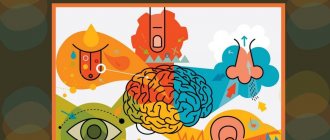Anyone who is interested in psychology, studies people and wants to learn how to influence them probably realizes the importance of understanding feelings, emotions and sensations. These three mental processes are reflected in facial expressions, gestures, posture and other elements of body language. A person is an open book that can be learned to read.
After reading this article and understanding what feelings, emotions and sensations are, you can take our profiling course, where you will learn to analyze people, their facial expressions, gestures, actions in order to better understand their motives and feelings. Let's study these concepts one by one and try to understand how this knowledge will help us better understand and influence people.
Feelings
Feeling is a human emotional process that reflects a subjective evaluative attitude towards real or abstract objects.
Unlike emotions and moods, the emotional processes described by the concept of “feeling” are tied to objects: they arise in relation to someone or something, and not to the situation as a whole. “I am afraid of this person” is a feeling, and “I am scared” is an emotion.
Here is a small list of feelings that we experience from time to time: love, hatred, fear, gratitude, respect, devotion, friendship.
Feelings vary in characteristics:
- Intensity: This is the strength of feeling. The stronger the feeling, the stronger its physiological manifestations and influence on human behavior. By observing him, you can understand what feelings overwhelm him the most, what is important to him and what he pays attention to.
- Valence: This is tone. Feelings can be pleasant, unpleasant and ambivalent. If everything is clear with the first two, then the last one may be of great interest to you. Why does a person have mixed feelings? Why? What are the underlying reasons? You will have to answer all these questions if you want to create a correct psychological portrait of a person and learn to influence him.
- Content: feelings reflect various aspects, features of the meaning of objects and situations that cause them. People show feelings based on context, so observe them carefully.
- Sthenicity: feelings are divided into sthenic and asthenic. The former encourage active activity, mobilize human strength (hate, love, and others). The latter paralyze or relax (for example, fear).
Feelings manifest differently among people because each person has their own set of personality traits and traits that influence feelings. The same feeling can be experienced and manifested differently depending on the emotional state a person is in at the moment. For example, the feeling of friendship can be accompanied at different times by emotions of joy, interest, resentment, shame and irritation.
Before you make a conclusion about a person, you need to observe him and try to identify both the feeling that he is currently experiencing and its underlying meaning.
Sinful passions are just a mistake of feelings
— Observing how much anger, aggression, hatred spills out into the same social networks, can we say that we are losing the ability to control our feelings and that this is a sign of the times?
— The outstanding psychologist Lev Semenovich Vygotsky spoke about the dual unity of intellect and emotions. This is such a contradictory couple that develops dynamically. The higher the intelligence, the more complex and varied the emotions. Emotions are never rational, but they are regulated by the intellect. Today this regulation is increasingly being lost. And in this sense, civilization, no matter how high its technological level, is replaced by barbarism. Overwhelm by emotions uncontrolled by the intellect is a sign of savagery. Today we feel this savagery more than ever.
— According to your observations, in what ways are our feelings becoming poorer today, and in what ways are they becoming richer?
— It seems to me that there is a standardization of feelings. A certain pattern in experiences is set. Remember the emotional reaction from Facebook moral guardians when people painted their avatars in certain flag colors after terrorist attacks committed in certain countries or institutions. Or assessments of some events that are far from unambiguous, for example, the transfer of St. Isaac's Cathedral. A person thinks differently than me, has the audacity to not coincide with a certain political or ideological mainstream - which means he needs to be banned, defriended, etc. Or let's take art. What is the difference between a real work of music, painting, theater, cinema? The fact that it evokes different, sometimes contradictory, and sometimes even mutually exclusive emotions. But mass, or box office, art presupposes an unambiguous reading and an unambiguous emotional reaction to a painting or performance. Fellini's films may or may not have enough fans, but a Hollywood blockbuster should appeal to everyone. Is this bad? Maybe not. Ancient tragedy also presupposed a certain emotional program; a person had to experience purification from passions through alternating affects of fear and compassion. The ancient tragedy has been replaced by a modern blockbuster. But the complex of feelings that a person experiences at the exit has not become more complicated, but simplified compared to the fifth century BC.
- Then, perhaps, we can say that our feelings depend on what cultural models we are guided by?
- Yes, sure. Russian philosopher Ivan Ilyin said that a person should strive to enlighten his sensuality. He has such a concept - enlightened sensuality.
- At the same time, there are eternal feelings - love, hatred, jealousy, envy... They will not disappear anywhere. But they can transform under the influence of time, can't they? Do we love differently today than we loved in the 19th century? Are we jealous otherwise? Are we jealous differently?
- Yes and no. If we look at the story of Heloise and Abelard, we will see that Abelard did not feel any special love in the romantic sense of the word for Heloise. He did not write her knightly poems, did not sing serenades under the balcony, did not suffer languidly. It was the relationship of a monk, a theological teacher, and a student, a relationship that grew out of erotic temptation. So patterns of feelings (in this case, love) are probably changing. The content of these models also changes. But not so much that the concept itself changes. After all, reading today about Eros from Plato, we are able to understand what the wings are that grow on the back when a person falls in love, we are able to understand how a person does not find peace in his desire to see his loved one. We can understand what love is by reading the poetry of Ancient Egypt. These feelings seem strange and incomprehensible to us, but in fact, here we are talking more about the ritualization of feelings, that is, about what accompanies them (for example, about methods of courtship), rather than about the feelings themselves. Let us remember “Mozart and Salieri” by Pushkin. When in the first monologue Salieri says that he envies Mozart, he hates himself for his envy, but this feeling overwhelms him. In the same way, jealousy is also one of the most powerful feelings. No matter how much a person explains to himself that jealousy is a low, vile feeling, he still begins to be jealous and secretly think about how to take revenge on his opponent. I think that it is the ritualization of feelings that is changing - what is the atmosphere of a feeling, a kind of its shell. The feeling itself remains the same.
Of course, there are cultural, political, social conditioning of emotions, but there are also emotions themselves. Whatever you say, man is a psychophysical being. He is characterized by what Descartes called the passions of the soul. These passions can also be sinful. Although “sin” in translation from Greek is a mistake. And sinful passions are just a mistake of feelings, a mistake of human behavior.
Emotions
Emotions are a mental process of medium duration, reflecting a subjective evaluative attitude towards existing or possible situations and the objective world. They tend to be much shorter lasting than feelings. For example, a feeling of devotion can last for years, but joy can last ten seconds.
Emotions, like feelings, differ according to the same characteristics: valence, intensity, sthenicity and content.
From a physiological point of view, an emotion is an active state of a system of specialized brain structures that prompts a change in behavior towards maximizing or minimizing this state. The emergence of emotions in a person goes hand in hand with physiological changes.
How can you recognize certain emotions? Let's look at the most common of them and find out how to understand when your interlocutor has them.
1
Anger
Anger arises when we cannot achieve our goal for some reason. Signs:
- redness of the neck and face;
- teeth grinding;
- growl;
- clenched fists;
- leaning forward and invading your personal space;
- strong, commanding poses;
- general aggressive body language.
2
Fear, anxiety and nervousness
Fear occurs when basic needs are threatened. There are many levels of fear, from mild anxiety to blind terror. The many bodily changes caused by fear make it easy to detect.
Anxiety is an anxious state of a person caused by a disturbance in peace. In this case, the person may not be in any danger, that is, the experiences will be meaningless and irrational, or they may have a serious basis.
Nervousness is a state of strong excitability of the nervous system, leading to sharp and acute reactions to minor stimuli.
Although these three emotions are different in some ways, they have similar manifestations in physiology and body language:
- cold sweat;
- pale face;
- dry throat (leading to lip licking);
- trembling lips;
- change in speech tone;
- errors in speech;
- trembling voice;
- visible high pulse (noticeable in the neck);
- sweating;
- muscle tension: clenched palms, intermittent movements;
- the desire to hold your breath;
- fussiness.
3
Sadness
Sadness is the opposite of happiness and indicates a depressed state. Signs:
- exhausted body;
- trembling lips;
- “flat” speech tone;
- tears.
4
Confusion
Confusion may be caused by guilt or a violation of values. Signs:
- redness of the face and neck;
- desire to look away (unwillingness to look a person in the eyes);
- grimacing;
- a fake, forced smile;
- changing the subject and trying to hide confusion.
5
Astonishment
Surprise occurs at the moment when something unexpected happens. Signs:
- raised eyebrows;
- dilated pupils;
- open mouth;
- sudden movement back.
6
Happiness
Happiness occurs when goals and needs are met. Signs:
- general muscle relaxation;
- smile (including smiling eyes);
- open body language.
You can also identify the cheater based on the information provided above. For such a person, facial expressions and body language do not coincide in time with his words: they are either ahead of them or late. The head makes mechanical movements, gestures contradict the meaning of the spoken words. Therefore, to understand a person, observe and listen.
Each generation has its own encyclopedia of feelings
— My students sometimes puzzle me with their reactions to something. Is it possible to talk about the emotional experience of a generation?
- I think yes. Each generation has its own emotional experience and its own encyclopedia of feelings. I recently returned from Kazan, watched a wonderful play “Winter” based on the play by Evgeny Grishkovets at the Youth Theater on Bulak. The heroes of the play are two soldiers who, in the end, die absurdly while performing a non-combat mission. The whole performance is a reminiscence of childhood, a stream of memories about the New Year tree, Santa Claus, the Snow Maiden, about buying a bicycle... This is a very strong emotional picture that appears before the eyes of a person of my generation. Once, after a lecture, a girl came up to me, dissatisfied, and said: “What are you telling us here? You retold everything that Grishkovets said on Thursday at his meeting with the audience.” I am not familiar with Grishkovets, I have never seen or heard of him, and I cannot say that this is a writer who fundamentally changed my personality. But in some ways we coincide with him. And this “something” is a common emotional experience, a common tone of experiences and feelings, a common, slightly detached, ironic view of some things. The emotional experience of my generation was formed at the May Day demonstrations, in the Komsomol, in the understanding of the truth of the teachings of Marx, Engels and Lenin. And the generation born ten to fifteen years after us is already different. It grew up instilled with other values, it acquired a different emotional experience. Sometimes on social networks I find pictures where some things from our childhood appear. Memes like these are a great way to emotionally return to the happiest time of your life. The French philosopher Gaston Bachelard even has such a concept - “imagination towards childhood.” It is there, in childhood, that our fantasies, our sensory world, and our attitude to life are formed. Probably, by this common emotional experience we can identify “our own”, distinguishing them from “not our own”. I am now observing this generational community through likes on Facebook. For example, someone posts a photo of the Moscow area where he was born and raised, and I can predict who will like this photo. If Facebook had existed in my youth, it would probably have posted the Cathedral of Christ the Savior, the Sukharev Tower, the Red Gate... Because it was nostalgia for the lost antiquity that we learned about at the end of the Soviet era. And this was also part of the emotional experience of my generation. I was once in Samara and talked with the abbess of the monastery, who told me about the youth: “Okay, they don’t go to churches, but they don’t sing the songs that we sang in our time.” Indeed, songs are one of the tests of emotional community. I ask the students, “Do you know Dark Night? Do you know “Oh, roads”? Until some time, probably until the early 2000s, they said: “We know.” Now they don’t know anymore.
Feel
Sensation is a mental process that is a mental reflection of individual properties and states of the external environment, subjects of internal or external stimuli and stimuli with the participation of the nervous system.
The properties of sensations are as follows:
- Intensity: a classic quantitative characteristic of sensations.
- Modality: qualitative description of sensations. Each type of sensation has its own modal characteristics. For auditory sensations, these may be pitch, timbre, volume; for the visual – color tone, brightness, saturation; for tactile – hardness, roughness, etc.
- Duration: characteristic of sensation over time.
- Localization: spatial characteristics of sensations, information about the localization of the stimulus in space. In some cases (interoceptive, pain sensations) localization is difficult and uncertain.
Sensation is an instant reaction of the body to an external stimulus. For example, cold, chilly, damp, light. This immediately triggers the emotion associated with it. If your interlocutor feels cold, first of all he feels it with his senses, and then develops an emotion: surprise, anger, anxiety.
What does this mean for those studying profiling? You will be able to identify a person’s attitude to changes in the external environment. For example, understand:
- Does he really like the taste of this soup?
- Does this song annoy him?
- How does he feel about this or that smell?
Communication is a complex process, which is mixed with body language, facial expression and a whole complex of physiological and mental manifestations. In order to learn how to read a person and influence him, it is important to understand what he experiences inside, and not what he says.
Feelings, emotions and sensations expressed on the face and body will tell you much more than words. Therefore, spend a significant amount of time to understand the intricacies of a person’s internal feelings, and this will help you understand not only him, but also yourself, which will also have a positive impact on the development of relationships with others.
We wish you good luck!
We also recommend reading:
- Storytelling
- Emotions and health: how they are interconnected
- How to express your emotions without becoming a manipulator
- The art of seeing emotions
- How to get rid of guilt
- Positive emotions
- Mental processes: types and brief description
- Guilt
- Self-control: what it is and how to develop it
- Passive aggression
- How to understand how a person feels
Key words:1Profiling
Mental shaking leads us to apathy
- Do you feel your feelings changing?
- Yes, sure. Maybe it has to do with age. Although the concept of age has changed somewhat in our era. If in the 19th century a forty-year-old man was considered an old man, now we may not call even a seventy-year-old man an old man. Apparently, age is not a biological concept, but a psychological one. And with age, feelings weaken. Aristotle wrote about this. He has a wonderful fragment in “Rhetoric” where he compares a young man and an old one and says that the old man does not talk about anything for sure, he talks about everything “as if” and “maybe”. That is, the old man is more distrustful than the young man, because he has experienced many disappointments, failures, and betrayals.
I ask the students: “Do you know “Dark Night”, “Oh, the Roads”?” Until some time they said: “We know.” Now they don't know anymore
— This is probably due not only to age, but also to the era in which we live. Do you think our emotional world has changed a lot over the past twenty years?
- He has undoubtedly changed. Today we react to everything differently. Emotions began to lose their sharpness. And this is also because we began to live in social networks, which increased the speed and severity of our emotional reactions. If in the old days we learned some news from the morning newspapers or from a letter received by mail, now we find out almost online. And immediately we plunge into a whirlpool of various emotions. Technological progress is changing humanity’s previous ideas about many things - for example, what is “fast” and “slow”, “close” or “far”. When Catherine II arrived in Crimea, “milestones flashed before her eyes,” although these were “Catherine’s miles” set by Potemkin, which were placed ten miles apart. Today, the “milestones” of information we receive not only flash before our eyes, we simply stumble over them every now and then. And this mental shaking leads us to apathy. We begin to perceive many things with greater indifference than before. Our emotions become dull. But sometimes it still hits us, and we experience emotional shock.
Sad boys and angry girls
In modern society, we are still subject to stereotypical ideas about what girls and boys should be like. These ideas are called gender roles. Traditionally, girls are expected to be soft, caring and sensitive. Boys are expected to be strong-willed and confident.
From a very tender age, we are divided by gender. Already in the maternity ward, girls are dressed in pink, and boys in blue. Girls are given dolls, and boys are given cars. Gender roles influence how girls and boys are raised.
Why is it important to understand your emotions?
Unfortunately, many people are not even aware of what emotions are and how to deal with them. What does this mean?
A person who does not understand his experiences does not understand himself, does not hear his needs. He doesn't get what he wants and therefore life doesn't seem like much fun. Hence depression and other neurotic disorders.
A clear example on this topic: a guy gets excited every time he has a date with a girl. His experiences are so strong (his face turns red, his hands are shaking, his mouth is dry, he is fainting) that every time he refuses the meeting. He has been alone for a long time and suffers from this.
If the man described above had recognized his emotions, he would have realized that he was experiencing fear. What is it based on? The guy is afraid that the girl will not like him, he doesn’t want to be rejected, because for him this is a disaster. What need is he concerned with at the moment? To please the female sex, to be in demand, desired, accepted.
Having mentally reached this point, perhaps he would have thought that there was no need to worry so much. In the end, there are many girls, and something will definitely work out with one of them.











